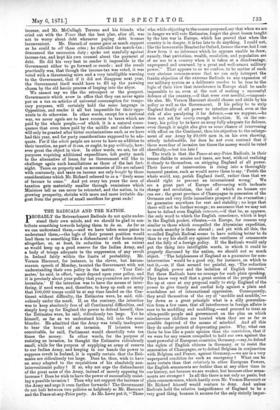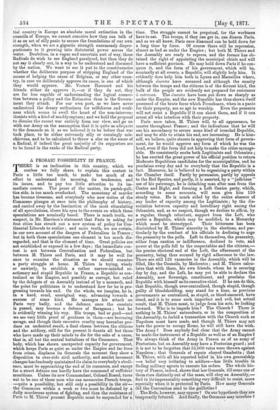THE RADICALS AND THE NATION.
PROBABLY the Retrenchment Radicals do not quite under- stand their own minds, and we should be glad to con- tribute something towards helping them to do so. As far as we can understand them,—and- we have taken some pains to
understand them,—the logic of their present position would lead them to something like a disbandment of the home Army altogether, or, at least, its reduction to such an extent as would keep up a good reserve for the Indian Army, and a body of troops adequate to the suppression of any revolt in Ireland fairly within the limits of probability. Mr.
Vernon Harcourt, for instance, in the clever, but harum- scarum speech of Monday, taunted the Government with not understanding their own policy in the matter. Your Esti- mates,' he said, in effect, 'must depend upon your policy, and it is precisely about your policy that you yourselves are utterly irresolute.' If the intention was to have the means of inter-
fering, if need were, and, therefore, to keep up such an army that 100,000 troops could be at any time landed on the Con-
tinent without difficulty, the Estimates were, he said, ridi- culously under the mark. If, on the contrary, the intention was to keep absolutely free of all Continental difficulties, and simply keep up for England the power to defend herself, then the Estimates were, he said, ridiculously too large. Yet he himself, as far as we understand him, fell into the same blunder. He admitted that the Army was totally inadequate to bear the brunt of an invasion. If invasion were conceivable, he said, Parliament would cheerfully vote ten times the money. In other words, for the purpose of resisting an invasion, he thought the Estimates ridiculously small, while for the purpose of supplying an army of reserve to our Indian Army, and keeping in our hands the power to suppress revolt in Ireland, it is equally certain that the Esti- mates are ridiculously too large. Does he, then, wish to have an army adapted to the requisitions of his absolutely non- interventionist policy? If so, why not urge the disbandment of the great mass of the Army, instead of merely opposing its increase ? Does he wish to have the power of successfully resist- ing a possible invasion Then why not support the increase of the Army and urge it even further forwards ? The Government do not halt between two policies -so helplessly as Mr. Harcourt and the Peace-at-any-Price party. As Mr. Lowe put it, "Those who, while objecting to the course proposed, say that when we are in danger we will vote Estimates, forget the great lesson taught
by the late war in Europe, which has proved that when the country is in danger, it is too late to do anything. I could not, like the honourable Member for Oxford, foresee the war, but I can draw from it an inference which he appears unable to draw, namely, that patriotism, wealth, resolution, and population are of no use to a country when it is taken at a disadvantage, unprepared and unarmed, by a great and well-armect military power." That appears to us we confess, to be matter of such very obvious common-sense that we can only interpret the frantic objection of the extreme Radicals to any expansion of our military system as a deliberate resolve to be true to the logic of their view that interference in Europe shall be made impossible to us, even at the cost of making a successful defence of the country,—if that were ever needful,—impoasi- ble also. Mr. Vernon Harcourt should choose and abide by his policy as well as the Government. If his policy be to strip England finally of all power to interfere abroad, even at the risk of also paralyzing it for defence,—as we suppose,—he does not ask for nearly enough reduction. If, on the con- trary, his policy be to have an army fully adequate for defence, even though it might also give us some chance of intervening with effect on the Continent, then his objection to the enlarge- ment of our Army by 20,000 men is, on his own showing, utterly indefensible, for does he not even contend that if there were fear of invasion ten times the money would be voted cheerfully,—but too late ?
The truth is that the Peace-at-any-Price Radicals, in their insane dislike to armies and taxes, are bent, without realizing it clearly to themselves, on stripping England of all power. Their horror of intervention is rising into a thoroughly immoral passion, such as would nerve them to say, Perish the whole world, nay, perish England itself, rather than that we should right or prevent an international wrong.' We see a great part of Europe effervescing with inchoate ohange and revolution, the end of which no human eye can see ; the great province of Champagne in possession of the Germans and very little immediate prospect of its evacuation ; no guarantee any where for rest and stability ; no hope that there will not be further wrongs ; no assurance that we may not have to defend even English interests,—if that be, as appears, the only word to which the English conscience, which is kept in the English pocket, vibrates,—in Europe, for reasons very similar to those which compelled the Abyssinian expedition, so much anarchy is there abroad ; and yet with all this, the so-called English Radical seems to have nothing better to do than to cry his shrill cry against the costliness of armaments and the folly of a foreign policy. If the Radicals would only put the thing into intelligible words, in which it could be properly discussed by the nation, we should not so much object. The helplessness of England as a guarantee for non- intervention' would be a good cry, for instance, on which to test it,—or, if that seemed too painful, say, The reduction of English power and the isolation of English interests.' But these Radicals have no courage for such plain speaking. They know very well that a great section of the people would fire up at once at any proposal really to strip England of the power to give timely and cordial help against a plain and scandalous act of international oppression. Consequently, they avail themselves of the cry of 'meddle and muddle,'— lay down as a great principle what is a silly generaliza- tion from a few eases, that all interference in foreign affairs is sure to be meddling and muddling,—and proceed to treat an
ultra-pacific people and government on the plan on which mischievous children are treated when they are as far as possible deprived of the means of mischief. And all this they do under pretext of deprecating panics. Why, what can there be less like a panic opinion than the conviction, that if we were for any reason compelled to hold our own against the most powerful of European countries, Germany,—say, to defend the rights of English citizens in Germany, or to resist the annexation of Champagne, or to defend Belgium in conjunction with Belgium and France, against Germany,—we are in a very unprepared condition for such an emergency? What can be
more certain than that relatively to other European Powers,
the English armaments are feebler than at any other time in our history, not because we are weaker, but because other arma-
ments are stronger ? In all this there is not only no panic, but plain common-sense, which hardly even Mr. Vernon Harcourt or Mr. Richard himself would venture to deny. And unless.
Radicals hold the relative insignificance of England to be a very good thing, because it secures for the only strictly impar- tial country in Europe an absolute moral extinction in the councils of Europe, we cannot conceive how they can talk of it as an act of silly panic to secure the foundations of our own strength, when we see a gigantic strength enormously dispro- portionate to it growing into dictatorial power across the water. Doubtless, in a vague and uncertain sort of way, these Radicals do wish to see England paralyzed, but then they do not say it clearly out, in a way to be understood and discussed by the nation. We want to see it put to the constituencies whether the deliberate purpose of stripping England of the means of helping the cause of Belgium, or any other coun- try, in case we deliberately approve its cause, is one of which they would approve. Mr. Vernon Harcourt and his friends either do approve it,—or if they do not, they are far less capable of understanding the logical connec- tion between a policy and the Estimates than is the Govern- ment they attack. For our own part, as we have never understood the dreary enthusiasm for selfishness and weak- ness which seems to swell the heart of the non-interven- tionists with a kind of muddy rapture; and we hold the proposal to dismiss the recent war entirely from our view, and go on with our Army on the assumption that it is quite as adequate to the demands on it as we believed it to be before that war took place, to be either extremely silly or cunningly mis- chievous, and to be calculated to throw a slur on the name of a Radical, if indeed the great majority of its supporters are to be found in the ranks of the Radical party.

































 Previous page
Previous page